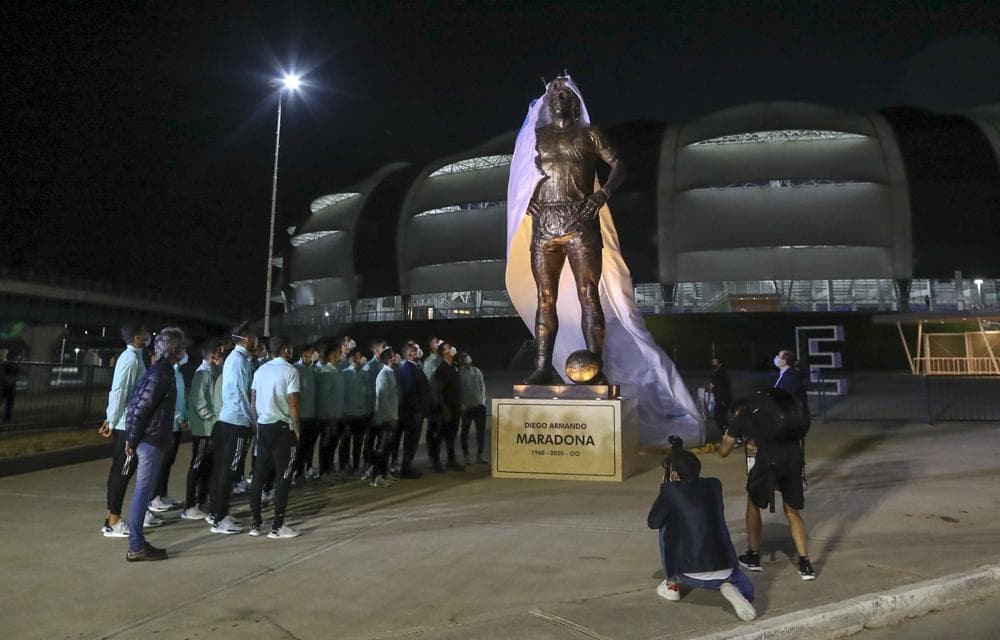ROME – Presumably, no place in the world was as thrilled Sunday night by Argentina’s victory in the World Cup as Buenos Aires, the national capital. A close second, however, probably came in the Italian city of Naples, where throngs of fans gathered to celebrate in front of a popular (and entirely unsanctioned) altar dedicated to Diego Maradona.
That’s right, I said an “altar.” In the Spanish quarter of Naples lies Piazza Dante, where in 2021 a makeshift altar was “consecrated” by locals, in the presence of the legendary Argentine soccer player’s son, Diego Maradona Jr.
Maradona may have died in 2020, but in Naples he’s very much still a living presence, nowhere more so than at his altar – which was constructed and furbished entirely through individual contributions, with no public or corporate funding. In effect, this is where Italy’s two great passions, popular Catholicism and calcio, meaning soccer, fuse into one.
The altar consists of a massive portrait of El Pibe de Oro, meaning “Golden Boy,” with golden angels wings on either side, and beneath it fresh blue and white flowers are arranged every day, representing the colors of both Argentina and also the local Naples club where Maradona starred from 1984 to 1992. Memorabilia from Maradona’s career surrounds the altar, as well as life-size murals.
Beginning at noon on Sunday, hundreds of Neapolitans began gathering at the altar to prepare for the World Cup final, most wearing jerseys of the Naples club from the era when Maradona led the team to Italian and Europeans championships.
Sociologically, it would have been difficult for a neutral observer to tell the difference between the scene in Naples on Sunday and, say, a popular religious festival – perhaps because, in the minds of many participants, the cult of Maradona is quasi-sacred.
It’s hard to explain the bond between Maradona and his adopted Italian home. In part, it’s because Maradona came from a poor background and so connected deeply with working class Neapolitans. It’s also in part because Naples is the capital of the underdeveloped and forgotten Italian south, and Maradona led them to triumph over the northern clubs that typically dominate the game here.
Oddly analogous to the Italian devotion to Padre Pio, the cult of Maradona is also premised on compassion for suffering. The more his life seemed to spin apart, including cocaine use, fathering an illegitimate son and alleged ties to mafia clans, the more locals embraced him as someone who could understand their own pathos. The fact Italian authorities also charged him with tax evasion only boosted his standing further, since it’s a crime of which virtually the entire nation is guilty in one form or another.
In Argentina, fans of Maradona actually have created a sort of faux religion centered on him called the Iglesia Maradoniana, complete with its own set of 10 Commandments and its own calendar. For the most part, however, this is self-conscious parody; in the streets of Naples, by way of contrast, the devotion feels raw and real, with nothing ironic about it at all.
In part, the exuberance in Naples and other parts of Italy over Argentina’s victory is explained by the fact that so many Argentinians are of Italian descent; the ancestors of Lionel Messi, the Argentine star, hail from the Marche region of central-eastern Italy. Moreover, since Italy didn’t qualify for this World Cup, many Italians saw Argentina as the logical substitute in terms of their rooting interests.
In the poor quarters of Naples, however, such considerations are secondary. To the people who live there, Maradona is something akin to a deity – a holy figure touched by God with greatness, who came to lift them out of their misery and provide a few shining moments of glory, and who now looks down upon them with compassion and understanding from lassù, meaning “up there.”
That’s what Neapolitans were cheering last night, in what can only be described as quasi-religious ecstasy derived from the traditions of popular Catholic devotion.
Oh, and one other thing: The last time Argentina won the World Cup was in 1986, with Maradona starring, and Naples went on that year to win its first Italian championship in its history. When Italy’s top-flight league Serie A went on break back in November to provide space for this year’s tournament, Naples was once again at the top of standings, eight points clear of second-place AC Milan.
Some Neapolitans, therefore, likely were sending up prayers to Maradona that history will repeat itself in the months to come.










